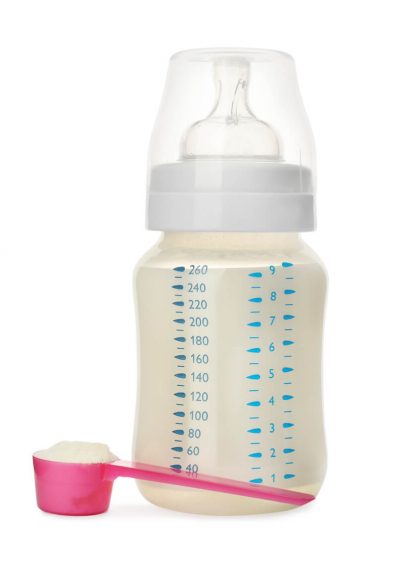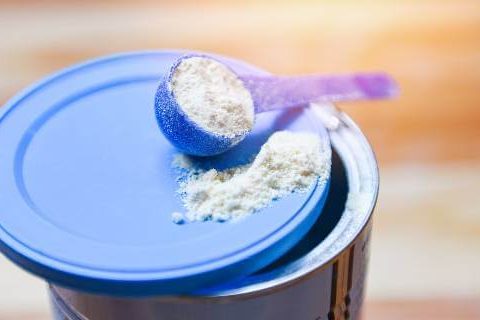Baby Formula and NEC
Studies have shown that premature babies fed cow’s milk baby formula have the highest risk of NEC, or necrotizing enterocolitis. NEC is a serious but rare intestinal tract disease that can cause tissue damage and deadly infections.

What Is NEC?
Necrotizing enterocolitis, commonly known as NEC, is a medical condition that leads to inflammation in the small and large intestines of newborn infants. Any infant may get NEC, but babies born prematurely or who are sick are more likely to get it.
Inflammation caused by NEC can cause several complications such as organ problems, intestinal tissue death, bowel obstruction, nutrient malabsorption, vitamin deficiencies, feeding difficulties and bacteria overgrowth. Bacteria can enter holes in the intestine and lead to deadly infections, such as sepsis.
Treatments for NEC include antibiotics and surgery. Doctors may remove a part of the baby’s bowel and check for holes in the intestinal tract. Babies will stay in the hospital for observation and treatment. Once babies are eating and not losing weight, they may be able to go home.
Signs and Symptoms of NEC
- Abdominal pain
- Lethargy
- Bloody stool
- Changes in blood pressure, breathing and heart rate
- Inability to gain weight
- Problems eating
- Refusal to eat
- Swollen, puffy abdomen
- Unstable body temperature
- Vomit that may be yellow or green
Babies with severe or worsening NEC may develop generalized swelling or fluid retention and low blood sodium levels. As NEC worsens, babies develop kidney problems and excessive potassium in the blood.
What Is the Link Between Baby Formula and NEC?
One of the first studies to link baby formula to NEC was a 1990 study that found premature babies fed formula were up to 10 times more likely to develop NEC. Breast milk didn’t show the same risk, and researchers have found that human breast milk may reduce the risk of NEC.
Researchers have hypothesized that antibodies, growth factors and immune cells in breast milk may be protective to a premature baby’s gut and this may prevent NEC. Cow’s milk baby formulas may be more difficult to digest and could cause inflammation that contributes to NEC, but more studies are needed.
Scientists continue to study the effects of formula on a baby developing NEC. Most recently, a clinical trial that began in 2021 and will continue through 2024 is set to gather data on infants fed formula or breast milk to better understand the link.
Which Babies Are Most at Risk for NEC?
Premature babies, babies who are sick or born with birth defects are at increased risk of developing NEC. It’s most common in preemies born before 37 weeks, according to the National Organization for Rare Disorders.
Babies born premature and under two pounds have the greatest risk. Formula feeding with cow’s milk baby formula can further increase the risk.
- Infections
- Serious illness
- Transfusions
- Birth before the 37th week of pregnancy
- Birth weight of under 5.5 pounds
- Feeding through a stomach tube
- Formula feeding with cow’s milk baby formula
- Hospital bacterial outbreaks
- Low blood oxygen levels at birth
About one in 1,000 premature babies and about one in 10,000 full-term babies may get NEC. Most babies develop NEC while still in the hospital.
Feeding premature babies mother’s milk or human milk from a donor may lower the risk of NEC.
Which Formulas Can Cause NEC?
Cow’s milk formulas — such as Enfamil, Similac and other brands — have the greatest chance of causing NEC compared to breast milk. A July 2022 animal study in Frontiers in Pediatrics found that some preterm baby formulas may be more damaging to the gut than others.
“Our findings indicate that not all preterm formulas are the same, and different formulations can have varying effects on intestinal inflammation, apoptosis and microbiome composition,” study authors wrote.
For example, researchers found that Similac Special Care caused more intestinal injury than NeoSure. Similac Special Care is a popular formula for preemies in the neonatal intensive care unit because it’s designed to help them grow and heal. NeoSure is a catch-up growth formula for premature babies who have already gone home from the hospital.
Have Any Baby Formulas Been Recalled?
In February 2022, Abbott issued a baby formula recall for Similac, Alimentum and EleCare after some babies died of Cronobacter sakazakii infections. All affected formulas came from Abbott’s Sturgis, Michigan, plant.
Abbott closed the plant to conduct investigations on bacterial contamination. The U.S. Food and Drug Administration has since inspected the plant and found Cronobacter in certain areas around the plant but not in product samples it tested. The recall and plant closure contributed to a national baby formula shortage, but the plant is back open.
In October 2022, Abbott issued another recall for certain lots of its ready-to-feed liquid formulas because some bottle caps might not have been sealed properly. Improperly sealed bottles could cause spoilage, leading to stomach problems in children who consume the formula.
Brands in this recall include Similac Pro-Total Comfort, Similac 360 Total Care, Similac 360 Total Care Sensitive, Similac Special Care 24, Similac Stage 1, Similac NeoSure, Similac water (sterilized) and Pedialyte electrolyte solution.
NEC Baby Formula Lawsuits
Parents whose premature babies developed NEC after consuming Enfamil or Similac have filed baby formula lawsuits against manufacturers Abbott Laboratories and Mead Johnson.
Lawsuits claimed that the companies knew or should have known that cow’s milk baby formula could cause NEC in preterm infants. But manufacturers continued to sell the formula and failed to warn parents and doctors.
In August 2022, judges consolidated baby formula lawsuits from across the country in Illinois multidistrict litigation. As of Dec. 15, 2022, there were 88 cases pending.
21 Cited Research Articles
Consumernotice.org adheres to the highest ethical standards for content production and references only credible sources of information, including government reports, interviews with experts, highly regarded nonprofit organizations, peer-reviewed journals, court records and academic organizations. You can learn more about our dedication to relevance, accuracy and transparency by reading our editorial policy.
- U.S. Judicial Panel on Multidistrict Litigation. (2022, December 15). MDL Statistics Report. Retrieved from https://www.jpml.uscourts.gov/sites/jpml/files/Pending_MDL_Dockets_By_District-December-15-2022.pdf
- Abbott. (2022, October 14). Abbott Voluntarily Recalls Certain Lots of 2 fl. oz./59 mL Bottles of Ready-to-Feed Liquid Products; Recall Is Not Expected to Impact U.S. Infant Formula Supply. Retrieved from https://www.abbott.com/corpnewsroom/nutrition-health-and-wellness/voluntary-recall-of-certain-2-fl-oz-liquid-products.html
- American Academy of Family Physicians. (2022, August). Necrotizing Enterocolitis. Retrieved from https://familydoctor.org/condition/necrotizing-enterocolitis/
- Rao, K. et al. (2022, July 6). Effect of Various Preterm Infant Milk Formulas on NEC-Like Gut Injury in Mice. Retrieved from https://www.ncbi.nlm.nih.gov/pmc/articles/PMC9299064/
- Perks, P.H., Borowitz, S.M. & Swanson, J.R. (2022, January). Nutritional Management of Infants with Necrotizing Enterocolitis. Retrieved from https://med.virginia.edu/ginutrition/wp-content/uploads/sites/199/2022/01/January-2022-Infants-with-NEC.pdf
- Wolters Kluwer. (2022). Modified Bell staging criteria for necrotizing enterocolitis (NEC) in neonates. Retrieved from https://www.uptodate.com/contents/image?imageKey=PEDS%2F54166&topicKey=PEDS%2F5019&source=outline_link
- National Institute of Child Health and Human Development. (2021, December 16). What are the symptoms of necrotizing enterocolitis (NEC)? Retrieved from https://www.nichd.nih.gov/health/topics/nec/conditioninfo/symptoms
- ClinicalTrials.gov. (2021, November 16). Infant Formula Feeding and Necrotizing Enterocolitis in Newborns. Retrieved from https://clinicaltrials.gov/ct2/show/NCT05121753
- Savarino, G. et al. (2021, November 14). Necrotizing enterocolitis in the preterm: newborns medical and nutritional Management in a Single-Center Study. Retrieved from https://ijponline.biomedcentral.com/articles/10.1186/s13052-021-01180-8
- Worsley, C. (2021, November 10). Necrotizing enterocolitis. Retrieved from https://radiopaedia.org/articles/necrotising-enterocolitis-1
- Cigna. (2021, September 8). Necrotizing Enterocolitis. Retrieved from https://www.cigna.com/knowledge-center/hw/medical-topics/necrotizing-enterocolitis-hw44299
- Cleveland Clinic. (2021, May 18). Necrotizing Enterocolitis (NEC). Retrieved from https://my.clevelandclinic.org/health/diseases/10026-necrotizing-enterocolitis
- National Library of Medicine. (2021, April 14). Necrotizing enterocolitis. Retrieved from https://medlineplus.gov/ency/article/001148.htm
- Zozaya, C. (2020, May 13). Incidence, Treatment, and Outcome Trends of Necrotizing Enterocolitis in Preterm Infants: A Multicenter Cohort Study. Retrieved from https://www.frontiersin.org/articles/10.3389/fped.2020.00188/full
- Quigley, M., Embleton, N.D. & McGuire, W. (2019, July 19). Formula versus donor breast milk for feeding preterm or low birth weight infants. Retrieved from https://pubmed.ncbi.nlm.nih.gov/31322731/
- Nemours KidsHealth. (2018, October). Necrotizing Enterocolitis. Retrieved from https://kidshealth.org/en/parents/nec.html
- Shulman, J. et al. (2017, January). Current Knowledge of Necrotizing Enterocolitis in Preterm Infants and the Impact of Different Types of Enteral Nutrition Products. Retrieved from https://www.ncbi.nlm.nih.gov/pmc/articles/PMC5227976/
- National Organization for Rare Disorders (NORD). (2015). Necrotizing Enterocolitis. Retrieved from https://rarediseases.org/rare-diseases/necrotizing-enterocolitis/
- Penn, A.H. et al. (2012, September 24). Digested formula but not digested fresh human milk causes death of intestinal cells in vitro: implications for necrotizing enterocolitis. Retrieved from https://www.nature.com/articles/pr2012125
- Children’s Hospital Los Angeles. (n.d.). Necrotizing Enterocolitis. Retrieved from https://www.chla.org/necrotizing-enterocolitis
- UPMC Children’s Hospital of Pittsburgh. (n.d.). Necrotizing Enterocolitis Symptoms and Treatment. Retrieved from https://www.chp.edu/our-services/transplant/liver/education/liver-disease-states/necrotizing-enterocolitis
Calling this number connects you with a Consumer Notice, LLC representative. We will direct you to one of our trusted legal partners for a free case review.
Consumer Notice, LLC's trusted legal partners support the organization's mission to keep people safe from dangerous drugs and medical devices. For more information, visit our partners page.
844-763-0072

